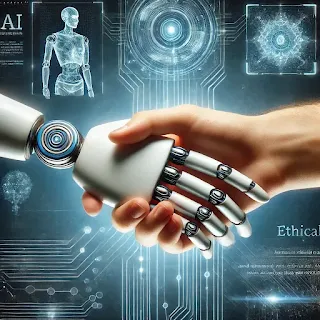The Future of AI in Everyday Life: How Artificial Intelligence is Transforming Our World
- Get link
- X
- Other Apps
The Future of AI in Everyday Life: How Artificial Intelligence is Transforming Our World
The Future of AI in Everyday Life: How Artificial Intelligence is Transforming Our World
Introduction
Artificial intelligence (AI) is no longer a futuristic concept—it’s already an essential part of our daily lives. From virtual assistants like Siri and Alexa to personalized recommendations on Netflix and Amazon, AI is revolutionizing how we interact with technology. But what does the future hold for AI? Will it enhance our lives, or should we be concerned about its rapid growth?
In this article, we’ll explore how AI is changing different industries, the latest trends, and what to expect in the coming years.
1. AI in Smart Homes and Personal Assistants

AI-powered smart home automation with a virtual assistant controlling lights, temperature, and security.

Our homes are becoming smarter, thanks to AI-powered devices that automate everyday tasks. Smart assistants like Google Assistant and Alexa use natural language processing (NLP) to understand and respond to voice commands.
🔹 Smart Home Automation: AI enables thermostats like Nest and security systems like Ring to learn user preferences and optimize energy use.
🔹 Voice Recognition: AI-powered assistants are getting better at understanding different accents and languages, making them more accessible.
🔹 Future Trends: The next step is AI-driven robotics that perform household chores like cleaning and cooking.
2. AI in Healthcare: Saving Lives with Smart Technology

A futuristic AI-powered city with self-driving cars and glowing skyscrapers at night

AI is playing a crucial role in medical research, diagnosis, and patient care. Machine learning algorithms can analyze medical data faster and more accurately than humans, leading to early disease detection.
🔹 Early Diagnosis: AI detects diseases like cancer through image analysis, increasing survival rates.
🔹 AI-Powered Surgery: Robotic surgeons like the Da Vinci Surgical System assist in complex procedures with high precision.
🔹 Telemedicine: AI chatbots provide medical advice, reducing the burden on healthcare professionals.
The future of AI in healthcare looks promising, with potential applications in personalized medicine and drug discovery.
3. AI in Finance: Smarter Investments and Fraud Detection
 |
| A_conceptual_image_of_AI_ethics_and_human_decision |
AI is transforming the finance industry by improving fraud detection, automating trading, and offering personalized financial advice.
🔹 Fraud Prevention: AI algorithms analyze transaction patterns to detect suspicious activities and prevent fraud.
🔹 Algorithmic Trading: Hedge funds and financial institutions use AI-driven algorithms to predict stock market trends.
🔹 Personal Finance: Apps like Mint and Cleo use AI to help users manage budgets and track expenses.
As AI evolves, it will further revolutionize financial decision-making and risk management.
4. The Ethical Challenges of AI
Despite its advantages, AI comes with ethical concerns, including job displacement, privacy issues, and biased algorithms.
🔹 Job Automation: AI is replacing traditional jobs, raising concerns about unemployment.
🔹 Bias in AI: AI models can inherit biases from the data they are trained on, leading to unfair outcomes.
🔹 Privacy Risks: AI-powered surveillance and data collection pose threats to personal privacy.
Regulations and ethical guidelines are needed to ensure AI is used responsibly.
Conclusion: What’s Next for AI?
AI is evolving at an unprecedented pace, offering both opportunities and challenges. As technology advances, it is crucial to strike a balance between innovation and ethical considerations. Whether it’s smart homes, healthcare, finance, or beyond, AI will continue to shape the future.
Are we ready for an AI-driven world? Only time will tell.
- Get link
- X
- Other Apps




Comments
Post a Comment